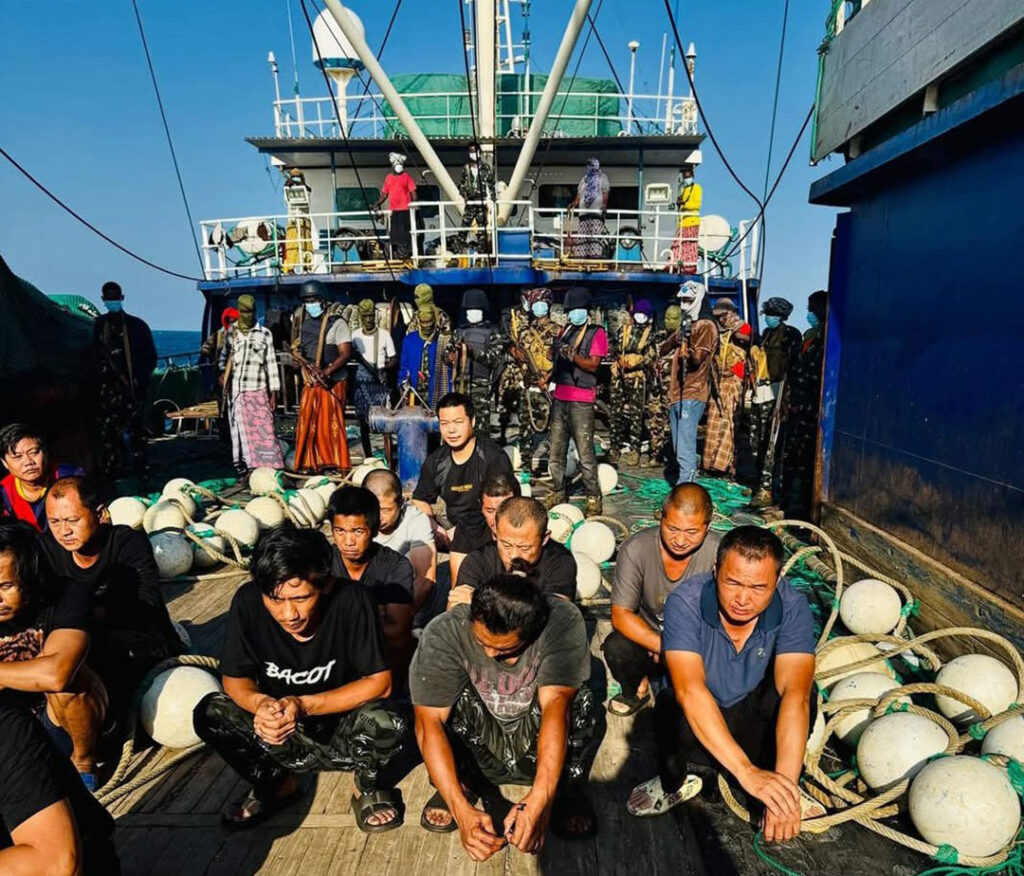From the shores of Eyl, a fishing community in Somalia’s autonomous Puntland State, locals watched with growing anger the lights of Chinese fishing trawlers illegally catching tuna, sharks, rays, lobsters, shrimp and other marine life in their waters.
They seethed as illegal, unreported and unregulated (IUU) fishing depleted their fish stocks while waste from the industrial trawlers polluted their shores. Illegal fishing threatens the livelihoods of artisanal fishermen in Eyl and around the country, which loses an estimated $300 million annually to the scourge.
By late November 2024, local fisherman Liban Hassan and a band of others had seen enough.
“The trawlers come here and take everything from our seas,” Liban, a pseudonym, told Al Jazeera. “Fish, lobsters, nothing is spared. When we go out at sea, they shoot at us, destroy our boats and prevent us from feeding our families.”
For weeks, Liban and his crew routinely observed one Chinese trawler fishing close to shore. Somali law prohibits trawlers from being less than 24 nautical miles from land. Liban said the Chinese trawler was 2 nautical miles from shore when he and his crew attacked it and disarmed two guards about 3 a.m. on November 25. The attack was reported as an act of piracy.
Abdifatah Bashir, another hijacker, said the group seized three AK-47s and bulletproof vests from the guards.
“That’s when we secured the ship and rounded up the crew,” Abdifatah told Al Jazeera. “We counted 18 crew members, then ordered the captain to steer the ship.”
Within days, Liban said the hijackers received calls from elders on land on behalf of local businessmen. They were asked to release the Chinese trawler and its crew for a ransom but initially refused the payment. For weeks, the trawler sailed along the Somali coast to evade authorities.
Local elders continued to mediate negotiations with involvement of the Chinese ambassador, according to Horn Observer, a news website. The hijackers eventually agreed to release the ship and its crew in exchange for $2 million in cash. The trawler was released and its entire crew set free on January 13, ending the seven-week siege. In exchange for the vessel and crew’s release, the government promised not to pursue the hijackers.
“The hijackers are youth and are known to the community,” Mohamud Khalid Hassan, a town elder in Eyl, told Al Jazeera. Other locals said the attack demonstrated the resentment locals feel toward the presence of Chinese and other foreign trawlers.
China commands the world’s largest distant-water fishing fleet and is by far the world’s worst illegal fishing offender, according to the IUU Fishing Risk Index, formerly known as the IUU Fishing Index. Of the top 10 companies engaged in illegal fishing globally, eight are from China.
Chinese trawlers also notoriously engage in bottom trawling, which involves dragging a huge net along the ocean floor, indiscriminately scooping up all manner of marine life. The practice kills juvenile fish, leading to declining fish stocks, and destroys ecosystems critical to the survival of marine life.
“What it would take 100 fishermen to capture in six months, [trawlers] can catch in a single day and we’ve seen it with our own eyes,” Liban told Al Jazeera.
The vessel that was hijacked, FV Liao Dong Yu 578, is part of a fleet of Chinese trawlers called Lia Dong Yu. A 2021 report by the Global Initiative Against Transnational Organized Crime reported that Lia Dong Yu vessels have operated and fished within the zone reserved for local Somali fishermen.
The Liao Dong Yu 578 had a license to fish from the Puntland State of Somalia, but it had expired in September 2024, months before the attack. A lack of enforcement of fishing rights, coupled with the impunity of China’s distant-water fishing fleet, is reminiscent of the conditions that caused some Somalis to take to piracy more than two decades ago.
What became an international scourge began with local fishermen who organized against overfishing and the dumping of waste in Somali waters.
However, Liban told Al Jazeera that he and his cohorts were only trying to protect their economic interests. “We are not pirates. We are a community under siege.”

